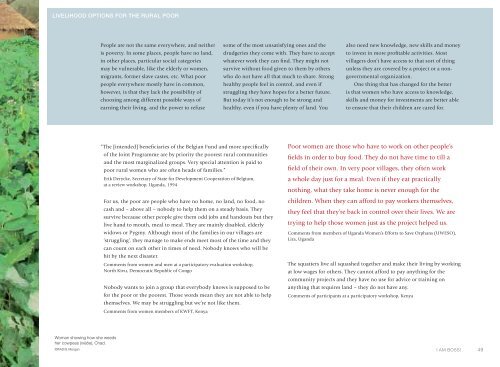You also want an ePaper? Increase the reach of your titles
YUMPU automatically turns print PDFs into web optimized ePapers that Google loves.
LIVELIHOOD OPTIONS FOR THE RURAL POOR<br />
People are not the same everywhere, and neither<br />
is poverty. In some places, people have no land,<br />
in other places, particular social categories<br />
may be vulnerable, like the elderly or women,<br />
migrants, <strong>for</strong>mer slave castes, etc. What poor<br />
people everywhere mostly have in common,<br />
however, is that they lack the possibility of<br />
choosing among different possible ways of<br />
earning their living, and the power to refuse<br />
some of the most unsatisfying ones and the<br />
drudgeries they come with. They have to accept<br />
whatever work they can find. They might not<br />
survive without food given to them by others<br />
who do not have all that much to share. Strong<br />
healthy people feel in control, and even if<br />
struggling they have hopes <strong>for</strong> a better future.<br />
But today it’s not enough to be strong and<br />
healthy, even if you have plenty of land. You<br />
also need new knowledge, new skills and money<br />
to invest in more profitable activities. Most<br />
villagers don’t have access to that sort of thing<br />
unless they are covered by a project or a nongovernmental<br />
organization.<br />
One thing that has changed <strong>for</strong> the better<br />
is that women who have access to knowledge,<br />
skills and money <strong>for</strong> investments are better able<br />
to ensure that their children are cared <strong>for</strong>.<br />
“The [intended] beneficiaries of the Belgian Fund and more specifically<br />
of the Joint Programme are by priority the poorest rural communities<br />
and the most marginalized groups. Very special attention is paid to<br />
poor rural women who are often heads of families.”<br />
Erik Derycke, Secretary of State <strong>for</strong> Development Cooperation of Belgium,<br />
at a review workshop, Uganda, 1994<br />
For us, the poor are people who have no home, no land, no food, no<br />
cash and – above all – nobody to help them on a steady basis. They<br />
survive because other people give them odd jobs and handouts but they<br />
live hand to mouth, meal to meal. They are mainly disabled, elderly<br />
widows or Pygmy. Although most of the families in our villages are<br />
‘struggling’, they manage to make ends meet most of the time and they<br />
can count on each other in times of need. Nobody knows who will be<br />
hit by the next disaster.<br />
Comments from women and men at a participatory evaluation workshop,<br />
North Kivu, Democratic Republic of Congo<br />
Nobody wants to join a group that everybody knows is supposed to be<br />
<strong>for</strong> the poor or the poorest. Those words mean they are not able to help<br />
themselves. We may be struggling but we’re not like them.<br />
Comments from women members of KWFT, Kenya<br />
Poor women are those who have to work on other people’s<br />
fields in order to buy food. They do not have time to till a<br />
field of their own. In very poor villages, they often work<br />
a whole day just <strong>for</strong> a meal. Even if they eat practically<br />
nothing, what they take home is never enough <strong>for</strong> the<br />
children. When they can af<strong>for</strong>d to pay workers themselves,<br />
they feel that they’re back in control over their lives. We are<br />
trying to help those women just as the project helped us.<br />
Comments from members of Uganda Women’s Ef<strong>for</strong>ts to Save Orphans (UWESO),<br />
Lira, Uganda<br />
The squatters live all squashed together and make their living by working<br />
at low wages <strong>for</strong> others. They cannot af<strong>for</strong>d to pay anything <strong>for</strong> the<br />
community projects and they have no use <strong>for</strong> advice or training on<br />
anything that requires land – they do not have any.<br />
Comments of participants at a participatory workshop, Kenya<br />
Woman showing how she weeds<br />
her cowpeas (niébe), Chad.<br />
©<strong>IFAD</strong>/S. Morgan<br />
I AM BOSS!<br />
49

















